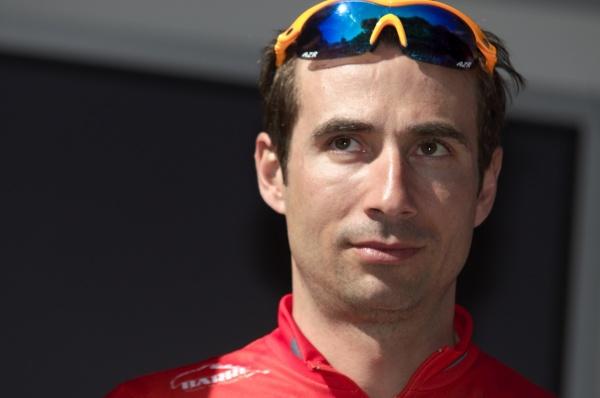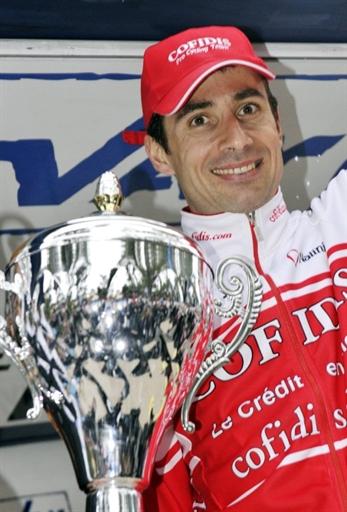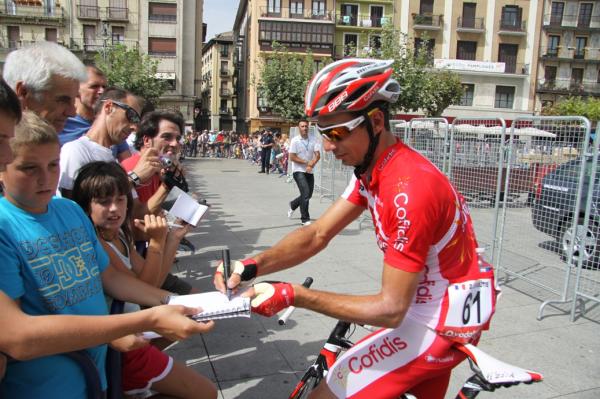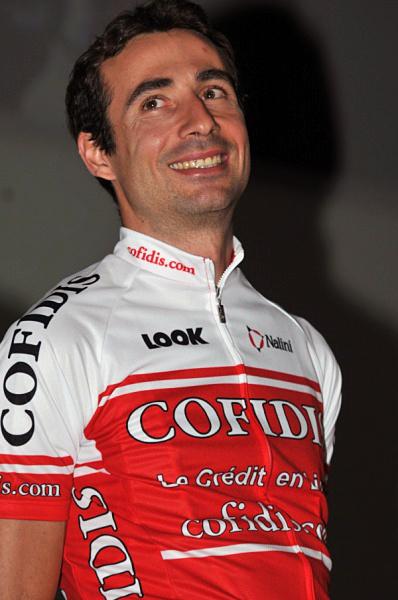Moncoutié rides into the sunset
Frenchman hangs up his wheels after 16 years at Cofidis




When the peloton entered the Gran Via for the finishing circuit of the Vuelta a España in Madrid, two riders had the honour of riding solo at the front for a little while as a symbol for their farewell: Grischa Niermann and David Moncoutié, who both hung up their wheels at the end of the Spanish Grand Tour. While the 36-year old German had planned his retirement since last December, Moncoutié had started the Vuelta with his future still shrouded in uncertainty. At the age of 37 and after crashing badly and pulling out of the Tour de France on stage 12, the Cofidis rider believed this would be his last race but he had thought that so, so many times before that he kept the possibility of one more contract in mind.
During the Vuelta, Moncoutié made his final decision as the race wasn’t going well for him. In each of the previous four years – after discovering only at the age of 33 that it was the Grand Tour best-suited to his characteristics – Moncoutié had won a stage and the King of the Mountains competition. This year, he aimed at being the first rider to show up with the blue polka dot jersey for the fifth time in a row but he was a long way off making it happen. “I kind of expected not to do it this year,” Moncoutié said. “The course was not as good for me as the previous ones. It was mostly made of uphill finishes at the end of flat stages, while my style is to break away on an early climb. Physically, I wasn’t too bad. I’ve tried on a few occasions but mentally, I wasn’t at the top. I was still affected by the crash at the Tour de France.”
Moncoutié has had worse crashes in his career but that one was too much. When he turned pro in 1997, he was often laughed at in the bunch because he struggled to put a rain jacket on. He was so lacking in agility on his bike that he needed to keep hold of his handlebars with at least one hand. In 1999, he missed out on his first participation in the Tour de France because of a fracture sustained a couple of days before the start. But his worst memory comes from his broken femur during the 2007 Tour de Romandie, which came just one year after the rupture of a patellar tendon had forced him to use crutches for six months.
It was easy to find Moncoutié in a bike race: he was either in a breakaway or at the very back of the pack. Former coach Cyrille Guimard, the legendary directeur sportif to Hinault, Fignon and Lemond, recruited him for Cofidis, and had this interesting analysis of Moncoutié: “He was kind of a misfit who managed to conduct a pro career because he understood the rules, but a team with ten guys like Moncoutié wouldn’t be a team. He races alone. But he was very important for the sponsor because of the TV exposure: there’s always a camera at the back of the bunch too…”
On numerous occasions, Moncoutié has proved very important to Cofidis, the only team he rode for in his 16-year pro career. Not only did he win 23 races, including two stages of the Tour de France (in 2004 and 2005), but he also rescued the sponsor when there were doping scandals. During the Festina Affair in 1998, Moncoutié was named to the police by some dopers as a young rider who didn’t take any drugs, like Christophe Bassons. While Bassons gained more publicity from these assertions, he didn’t last in the peloton like Moncoutié.
After Frank Vandenbroucke’s arrest by the French police in 1999, Cofidis resurged when Moncoutié won his first pro race: stage 6 of the Dauphiné. When the Cofidis team stopped racing in April 2004 in light of the events that led to the revelations of doping practices by Philippe Gaumont and David Millar, Moncoutié was once again the counter-example, according to all witnesses. After the 2007 drama of the Cofidis team leaving the Tour de France due to the positive test of Cristian Moreni, the sponsor remained on board because Moncoutié kept providing hope for clean cycling. “If I could, I’d have ten clean riders like David in my team,” said the boss François Migraine.
“I never dreamt about becoming a professional cyclist,” Moncoutié recalled. “It just happened because Guimard came to see me on the eve of the 1996 French national amateur championship with a contract and I signed it. I thought I’d do two years, only to see what it was about. Everything I’ve achieved has been way beyond my expectation.” At the same time, many riders believe that Moncoutié has achieved little compared to his physical capacities as a climber. He was rarely well-positioned at the bottom of the climbs and cycled more with the mentality of a fun rider than of a professional. He also earned himself a reputation of being selfish and received more respect in Spain than anywhere else towards the end of his career, as AS newspaper wished him “muchas suerte [lots of good luck], monsieur” after his farewell in Madrid. Moncoutié didn’t have any career plan and doesn’t have more of a post-career plan either, except riding his bike “with no stress next year” and looking after his children. His third son is due to be born in October.
The latest race content, interviews, features, reviews and expert buying guides, direct to your inbox!